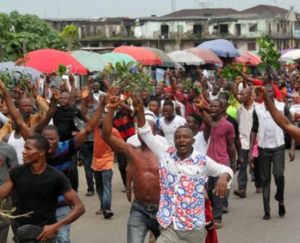Key Insights, you need to know, from Recent Protests
Key Insights, you need to know, from Recent Protests

The protests over the escalating cost of living, which began eight days ago, are gradually subsiding, and stability is returning to most regions in Nigeria. As we reflect on these events and how we can progress as a nation, there are several important points to consider.
The rising cost of living has sparked widespread discontent across Nigeria. While opposition parties have seized this moment for political gain, it’s crucial that our response remains objective and focused on the well-being of all citizens, free from political agendas. The scope and intensity of public grievances go beyond mere political maneuvering. To address this, the government should adopt a compassionate and practical approach to combatting hunger and poverty, engaging with Nigerians proactively and constructively.
Going forward, it’s essential for both state governments and the National Assembly to play active roles. With 469 legislators representing various constituencies across Nigeria and 36 state governors alongside the Minister of the Federal Capital Territory, there’s a significant opportunity to communicate directly with citizens about the impacts of government actions. President Bola Ahmed Tinubu has already allocated approximately N1 trillion to states and the FCT in the past year and has increased FAAC disbursements significantly. These efforts, however, need clear communication to highlight their effectiveness.
State governors and federal officials should ensure their actions are both transparent and empathetic. It’s important for leaders to understand that many complaints come from their own supporters. Addressing these grievances with respect and clarity can help build trust and maintain citizen confidence.
The recent decision by the House of Representatives to donate 50% of their salaries for six months falls short. A more direct approach would be for legislators to personally distribute any sacrifices they wish to make among their constituents. Furthermore, legislators should consistently engage with their communities, sharing their legislative efforts and gathering feedback.
In these challenging times, all levels of government must demonstrate empathy and responsibility. Excessive displays of wealth by officials amid widespread hardship can undermine the government’s efforts and contribute to public disillusionment. There needs to be a shift toward more sensitive behavior from senior officials, aligning their conduct with the government’s objectives.
Political leaders should also practice restraint and respect in their communications, acknowledging the severe economic conditions affecting millions of Nigerians. Their behavior and messages should reflect an understanding of the people’s struggles and align with the President’s policies to foster trust.
The socio-economic issues facing Nigeria are exacerbated by both global economic factors and past governance failures. Addressing these challenges requires proactive and practical strategies. Leaders should be wary of attributing unrest solely to opposition forces, as this can overlook genuine public frustration and lead to uncontrollable unrest. Historical precedents, such as the Arab Spring and recent events in countries like Sri Lanka and Bangladesh, underscore the need for responsive governance.
Violent protests can have long-lasting and devastating impacts. It’s critical for government officials to exhibit emotional intelligence and a deep understanding of the public’s dire situation. This approach will be vital for the success of President Tinubu’s administration and for navigating Nigeria through its current socio-economic challenges.
TRENDING SONGS
 Shock in Anambra: Bride Disappears Moments Before Wedding
Shock in Anambra: Bride Disappears Moments Before Wedding
 Nigerian Woman Returns ₦330 Million Accidentally Credited to Her Account
Nigerian Woman Returns ₦330 Million Accidentally Credited to Her Account
 APC Don Reach Morocco?’ VeryDarkMan Reacts to Seyi Tinubu Poster
APC Don Reach Morocco?’ VeryDarkMan Reacts to Seyi Tinubu Poster
 Bride Breaks Down in Tears as Wedding Meals Were Kept Secretly While Guests Go Home Hungry
Bride Breaks Down in Tears as Wedding Meals Were Kept Secretly While Guests Go Home Hungry
 Odogwu by Day, Robber by Night: How Marriage Joy Turned Into Tragedy
Odogwu by Day, Robber by Night: How Marriage Joy Turned Into Tragedy
 Nigerian Officials Allegedly Pocket N4–6B Weekly Through Smuggling Cartels at Seme–Badagry Border
Nigerian Officials Allegedly Pocket N4–6B Weekly Through Smuggling Cartels at Seme–Badagry Border
 Ahmad Yerima: Naval Officer to Face No Sanctions After Clash with Wike – Matawalle
Ahmad Yerima: Naval Officer to Face No Sanctions After Clash with Wike – Matawalle
 Trending Video: Muslim Man Joins Wife in Hallelujah Challenge ‘Dress Like Your Miracle’ Night
Trending Video: Muslim Man Joins Wife in Hallelujah Challenge ‘Dress Like Your Miracle’ Night
 Woman Seeks Advice as Late Brother’s Wife Refuses to Mourn Him Following His Death With Alleged Mistress
Woman Seeks Advice as Late Brother’s Wife Refuses to Mourn Him Following His Death With Alleged Mistress
 Nobody Cares About Fine Girls In The UK, I Miss Nigeria — Nigerian Lady Laments
Nobody Cares About Fine Girls In The UK, I Miss Nigeria — Nigerian Lady Laments
Share this post with your friends on ![]()













